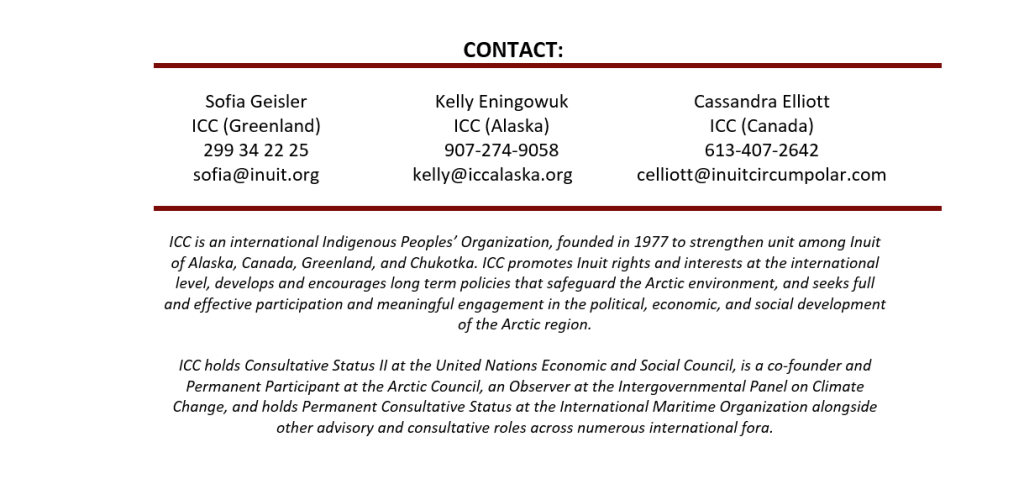27 November 2025—Belém, Brazil—Being promoted as the “Indigenous COP”, COP30 closed Saturday afternoon in Belém with few commitments to the rights of Indigenous Peoples. Landmark achievements shine a light on Indigenous Peoples’ strong advocacy.
Over the two weeks of COP30, ICC delegates worked as part of the International Indigenous Peoples’ Forum on Climate Change (IIPFCC) to advance the priorities and concerns of Inuit and all Indigenous Peoples on climate change.
“Climate change is adversely affecting Inuit. Coastal erosion and extreme weather events are forcing communities to relocate. Fifty percent of our infrastructure will be at risk by 2050 due to permafrost thaw, and we are losing access to hunting and fishing as sea ice decreases. ICC has called on the world to combat climate change over decades, and despite some progress, negative consequences to Indigenous Peoples from a lack of global action continue”, said ICC Chair Sara Olsvig.
The range of negotiations items relevant for Arctic Indigenous Peoples included a Just Transition Work Program, access to climate finance – including for adaptation and loss and damage – and carbon credit mechanisms. Across all COP negotiations, ICC contributed to strong advocacy on text that would uphold the rights of Indigenous Peoples and recognize the leadership of Indigenous Peoples in climate action. Although much of this was not reflected in the final approved text, a few landmark achievements were included.
No Just Transition without the Rights of Indigenous Peoples
COP30 included negotiations for a Just Transition Work Program, aimed at speeding up transition from fossil fuels to other energy sources. A Just Transition Mechanism was approved in the closing session.
“It is important that states recognize that there can be no just and effective transition without the rights of Indigenous Peoples. I am therefore pleased that the significant efforts of the International Indigenous Peoples’ Forum on Climate Change resulted in a standalone operative paragraph in the Just Transition Work Program text emphasizing the rights of Indigenous Peoples, including the right of self-determination, while historically highlighting the need for protection of Indigenous Peoples in Voluntary Isolation,” says Chair Sara Olsvig.
No full and effective participation
While at COP30, ICC Chair Sara Olsvig represented the Arctic Indigenous sociocultural region in numerous activities, including bilateral meetings between the Global Indigenous Caucus and the UN Secretary and General as well as the European Commission where Indigenous Peoples’ priorities and concerns were raised.
“This COP was nicknamed the “Indigenous COP”. The persistent advocacy by Indigenous Peoples resulted in important provisions in the Global Mutirão which was the overarching text adopted by all states at COP30. However, the overall outcomes do not reflect the leadership that we offer as Indigenous Peoples in climate action, and in some cases include language that poses a serious risk to our rights,” said ICC Chair Sara Olsvig. “What we saw at COP30 was a focus on symbolic presence rather than enabling the full and effective participation of Indigenous Peoples, and the results of the negotiations are worse for it.”
States failed to address key issues related to the transition away from fossil fuels, including mining of critical minerals and language on fossil fuel phase out. Mining continues to pose a risk of land encroachment, deforestation and violations of the rights of Indigenous Peoples. The IIPFCC had called for including language on safeguards of the rights of Indigenous Peoples in relation to mineral extraction, but the lack of agreement between states meant that the COP30 outcomes omitted any language on these important components of the transition agenda.
Solidarity from the Arctic to the Amazon
On the Sunday between negotiations weeks, ICC Chair Sara Olsvig attended a listening session between Indigenous leaders of the Amazon and COP30 delegations. Olsvig reaffirmed Inuit solidarity with Amazonian Indigenous Peoples, who face continued violence, killings of land defenders, land encroachment and violations of human rights.
“From the Arctic to the Amazon, we stand together as Indigenous Peoples. ICC condemns the killing of Indigenous land defenders, which continued to take place during the COP30. Our work to demand that states recognize our rights, our leadership, and our contributions to addressing the climate crisis that is affecting us all will continue.”
ICC attended the COP representing a united Inuit voice advocating for:
- Direct, equitable and ongoing access to climate finance for Inuit;
- Full and effective participation and meaningful engagement in the UNFCCC process through the Global Indigenous Caucus;
- Climate change work based on a strong human rights foundation, including the UN Declaration on the Rights of Indigenous Peoples;
- Ethical and equitable engagement of Inuit and Indigenous Knowledge in decision-making; and
- A just transition that respects the inherent right of self-determination, where Inuit do not bear the cost of transitioning to safe alternative fuel or energy sources and determine their own political, social, and economic priorities.
The International Indigenous Peoples’ Forum on Climate Change’s closing statement from Saturday, November 22 can be found here:
